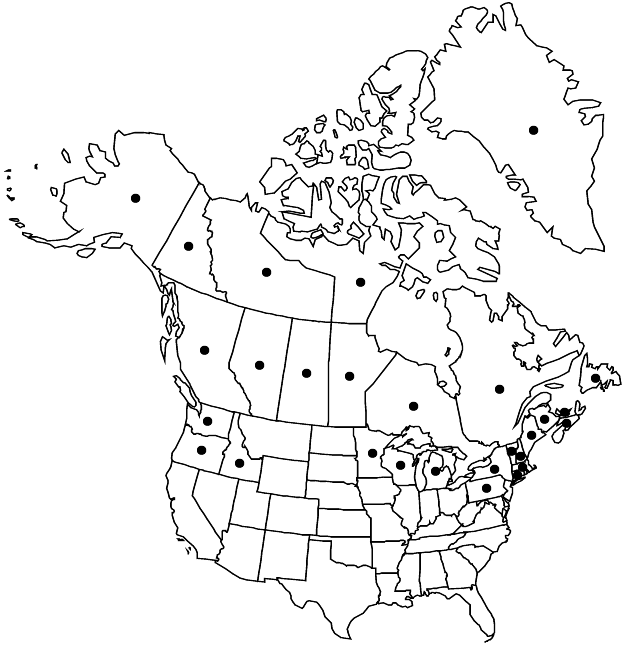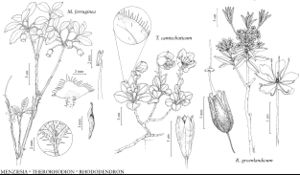Rhododendron groenlandicum
Syst. Bot. 15: 67. 1990 ,.
Shrubs, 0.2–1.5 m, rhizomatous. Stems erect and/or prostrate; bark smooth, sometimes peeling or shredding with age; twigs unicellular-hairy and with flattened, glandular scales, scales often obscured by dense, ferruginous, long-crisped, unbranched, multicellular hairs. Leaves persistent, (fragrant when crushed); petiole with unicellular and/or peltate scales and sometimes ferruginous, long-crisped, multicellular hairs; blade ovatelanceolate, sometimes narrowly elliptic to linear, 2–5 × 1.5–2.5 cm, coriaceous, margins entire, weakly to strongly revolute, glabrous, apex acute, abaxial surface with sparse to dense glandular-peltate scales without broad rim, scales often obscured by dense (to sparse), ± even covering of ferruginous, long-crisped, unbranched, multicellular, eglandular hairs usually concealing midvein, adaxial surface ± rugose with scattered, lepidote scales and sometimes also unicellular-hairy along sometimes impressed midrib. Floral bud-scales with lepidote scales, unicellular-hairy abaxially, margins unicellular-hairy. Inflorescences slightly rounded, 10–35-flowered; bracts densely lepidote, sometimes with long-crisped hairs abaxially, margins ciliate, hairs long-crisped. Pedicels 12–25 mm, with unicellular and/or glandular-peltate scales, sometimes multicellular-hairy (hairs ferruginous, long-crisped). Flowers radially symmetric, opening after leaves (of flowering shoots), ± erect, not fragrant; calyx lobes ca. 1–1.5 mm, outer surface densely to sparsely unicellular-hairy (hairs tan) and multicellular stipitate-glandular-hairy (hairs red) on margins; corolla white to cream, without blotch, ± rotate, 2–8 mm, inner surface densely unicellular-hairy, petals appearing distinct or only slightly connate basally, lobes 5–7 mm; stamens (5–) 8 (–10), exserted, ± equal, 3.8–9.5 (–11) mm; filaments glabrous or proximally unicellular-hairy. Capsules borne on broadly recurved pedicels, 3–5.5 × 4–6 mm (slightly longer than wide), with sparse, lepidote scales, sometimes also long-crisped-hairy, acropetally dehiscent. Seeds somewhat elongated beyond narrow ends; testa closely appressed. 2n = 26.
Phenology: Flowering spring-mid summer.
Habitat: Bogs, spruce forests, muskeg, swamps, stream margins, talus slopes, tundra
Elevation: 0-2000 m
Distribution

Greenland, Alta., B.C., Man., N.B., Nfld. and Labr. (Nfld.), N.W.T., N.S., Nunavut, Ont., P.E.I., Que., Sask., Yukon, Alaska, Conn., Idaho, Maine, Mass., Mich., Minn., N.H., N.Y., Oreg., Pa., Vt., Wash., Wis.
Discussion
Rhododendron groenlandicum, R. columbianum, and R. tomentosum customarily have been placed in the genus Ledum. Ledum is here considered to be a subsection of Rhododendron subg. Rhododendron (as subsect. Ledum), a placement supported by the presence in these species of comparable complex, multicellular, glandular, peltate scales and phylogenetic analyses of morphological and molecular data. The glandular scales of species of subsect. Ledum lack the radiating, broad-rimmed fringe-cells found in some members of subg. Rhododendron (and characteristic of R. minus and R. lapponicum) but are essentially identical to those of species of subsect. Edgeworthia, e.g., R. pendulum (see K. A. Kron and W. S. Judd 1990). More than 500 species of subg. Rhododendron occur in tropical and temperate eastern Asia (J. Cullen 1980; D. F. Chamberlain et al. 1996).
Selected References
None.
Lower Taxa
"elongated" is not a number.
